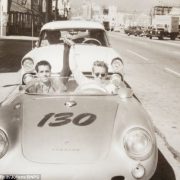Why Car Makers Invest in Motorsports

There are currently about 500 official motorsport circuits and several hundred international race series worldwide. While some struggle for their financial existence, many circuits and series still have a great number of spectators and an extensive media coverage. The question here is, what is the impact on car brands and their relationship with the customers?
Technology developments
Are you one of those people who are enthusiastic about motorsports? If yes, you are part of a large community. Despite the climate and environmental debate around cars over the past years – the love for motor sports stays true. This is very much to the satisfaction of both operators, participants and spectators.
This acceptance and enthusiasm of the general public is the result of a decades long commitment between car makers and motorsport committees who ambitiously revise and tweak motorsports’ rules with the objective of advancing technology. In this way they create a sustainable and credible external image which is also continually adjusted to be up-to-date and trend setting.
Some technologies developed for motorsports have found their way into our own vehicles. For example, the dual clutch transmission was applied in motorsports by Porsche in the eighties. In the same way, the high-performance capacitor based hybrid technology was first developed for motorsports more recently.
When motorsports becomes marketing
There is also a question whether the investment of participating in these races pays out. The sports car manufacturers usually participate for two main reasons: testing and exposure. There is nowhere else that can they recreate the extreme conditions and extreme load that is found in endurance races. Sports performance is one of the key elements of a sports car manufacturers external image and very much required for customer satisfaction.
Similarly, car manufacturers ask themselves how a successful image can be built in a way that can be used for marketing campaigns that are meaningful and credible to their customers. In sports – especially in motorsports – the problem is that on one hand while second-placed competitors are spurned as just an also-ran in the media, victories can also be quickly forgotten.
Long-term participation and recurring wins
It is really only through a successful long-term commitment to motorsports that a sports car manufacturer can establish a worldwide brand and continually reinforce its image as a car maker.
Let’s take Porsche again as an example: by splitting their engagement to different race series (rally, endurance racing, several DTM racing classes and Formula 1) and their continuous successes, Porsche advances to all essential areas and has created a strong brand. This way Porsche is able to acquire new customers buying Porsche cars.
This makes it difficult for manufacturers who only make a short term commitment to leverage this into a customer demand for their products. It is also hard to build customer satisfaction thanks to their meeting the aspirations they have created with their sports activity.
Is the presence and the success of an automaker in motorsports series (DTM, Formula 1, …) important for you?
*Article image: Porsche 911 RSR (77), Dempsey Proton Racing: Patrick Dempsey, Patrick Long, Marco Seefried
 Author: Benjamin Brodbeck @automativ
Author: Benjamin Brodbeck @automativ
Benjamin Brodbeck, 24 years old, is a multifaceted petrolhead. Besides his work as a jazz pianist, he brings his passion and knowledge about cars as a publicist at AUTOmativ.de. He studied Automotive Business Management and is currently doing his master’s degree in journalism at the University of Vienna.
Interested in becoming an Automotive Evaluator with BARE International?
[maxbutton id=”9″]
Want to be a guest blogger for BARE’s Automotive community We Are Cars?
Apply to: wearecars@bareinternational.com







